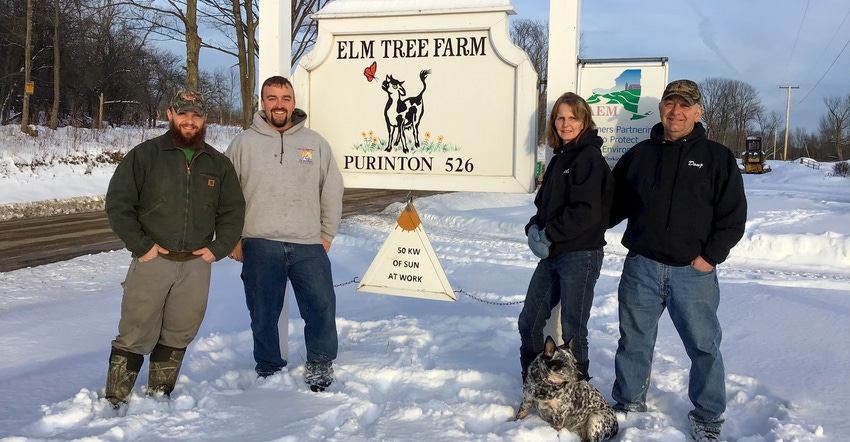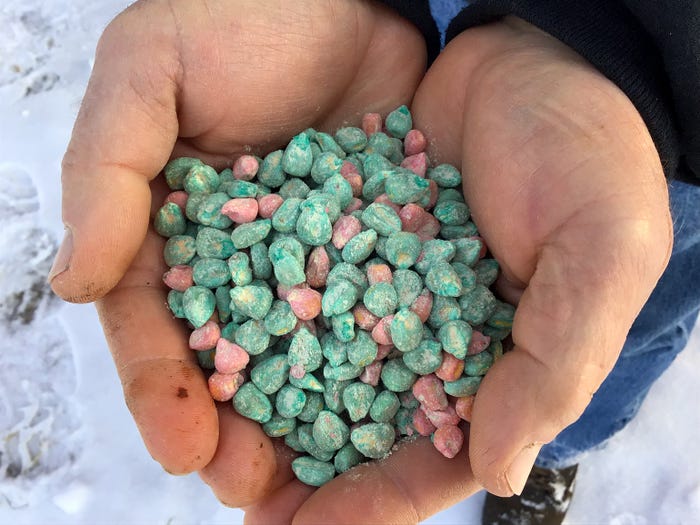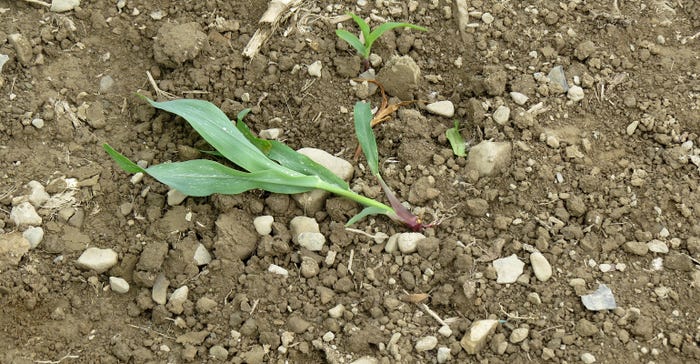January 3, 2020

“Yes! Yes!” was Doug Purinton’s response when asked if he would host a trial of a seed treatment to deter bird damage in field corn.
Doug and his wife, Julie, and their two sons, Jordan and Nathan, have been fighting a crow problem for 15 years at their Elm Tree Farm in Norway, N.Y., where they grow corn for a dairy herd and young stock. They also raise grass-fed Angus beef.
Julie, Jordan and Nathan are full-time teachers who work the farm in their off hours, so Doug is the one who deals most with the problem of crows pulling at emerging corn sprouts to eat the softened seed.
When they lost 24 acres in a two-day span to crows, “I was ready to give up on corn,” Doug says.
As larger flocks of crows started appearing on the farm, the Purintons started to find more and more corn seedlings withering in the rows of their 405-acre farm. They tried a bunch of bird deterrence strategies.
“One year we parked tractors with blaring radios in the fields. We rode through the fields with our ATV every half hour. We hung aluminum pie plates. Older farmers shared wisdom about hanging dead crows, shot legally during crow season, from tall poles in each field, and we tried discharging a gun to scatter the gathering flocks,” Doug says.
They had success with planting seed deeper into the ground to make them harder to pull out, but that failed during wet years because the seed would rot before the plant could emerge.
“While wildlife damage by turkey, bear, deer, raccoon and porcupine through the years was aggravating and costly, that seemed minimal to the crow damage we were experiencing,” he says.
They tried adjusting their planting schedule so the crop would emerge after neighboring fields sprouted.
“Not good neighbor behavior,” he admits, “and the crows saw through that plan, with our fields as a future dessert crop!”
Desperate for a solution
In 2015, the Purintons heard about a seed treatment that was deterring crows and other nuisance birds but was not approved for use in New York state.
In 2017, Paul Curtis, a Cornell University professor of natural resources and wildlife Extension specialist, tested a product called Avipel Shield. Ken Wise, a livestock and field crops IPM Extension educator, coordinated a New York Farm Viability Institute-funded trial with Extension personnel from eight counties.
 SEED TREATMENT: Avipel Sheild includes anthraquinone, a derivative of plants such as rhubarb and buckthorn, which causes intestinal upset in birds and can be effective at deterring crows.
SEED TREATMENT: Avipel Sheild includes anthraquinone, a derivative of plants such as rhubarb and buckthorn, which causes intestinal upset in birds and can be effective at deterring crows.

Avipel Shield is a seed treatment that uses anthraquinone, a derivative of several plants including rhubarb and buckthorn. The product is distasteful to birds and does just enough to deter crows’ interest in treated seed. Farmers can plant pretreated seed or add the treatment into a seed hopper.
Trial success
Eleven farms had 5-acre trial plots established. On half of the plots a 97-day, multipurpose triple-stacked corn hybrid with a typical insecticide and fungicide package was used to minimize trial variables.
The other plots were the farmer’s choice.
"From 2016 to 2018 we saw averages per year in treated plots that ranged from 547 to 3,468 more corn plants per acre in side-by-side trials compared to non-treated plots at the V3 growth stage. When the three years of data were pooled across 40 fields of side by side trials, the results showed a significant difference, with the Avipel treatment resulting in 1,105 more plants per acre than the non-treated control," Wise says.
He notes that the repellent protected corn plantings in some of the adjacent nontreated plots from crow feeding. However, a larger study with more replications is needed to determine if the crows remember fields treated with Avipel Shield within or between years.
Anthraquinone has been shown to prevent corn seedling damage by pheasants and cranes in the Midwest. Because birds and mammals perceive taste very differently, it does not affect corn seedling damage by mammals.
“The results of this project are exciting for many reasons, not the least of which they address a problem that was generating ‘do something about the birds’ calls from growers losing up to half their plantings, and they address it in a relatively inexpensive way. Our trials showed a $5- to $7-an-acre cost to apply the treated seed,” he says.
 TASTE FOR SEEDLINGS: Crows are efficient at damaging young cornfields by plucking the seed from young plants.
TASTE FOR SEEDLINGS: Crows are efficient at damaging young cornfields by plucking the seed from young plants.

Wise adds that Avipel Shield is now approved for use in New York. It can be applied as pretreated seed or mixed into the corn planter.
For more information, contact Ken Wise at 845-677-8223, ext. 149, or email [email protected].
Dunn writes from her farm in Mannsville, N.Y.
Note: Doug Purinton provided his NYFVI annual meeting presentation notes for excerpts. The New York State Corn and Soybean Growers Association also provided funding for the trials.
About the Author(s)
You May Also Like




